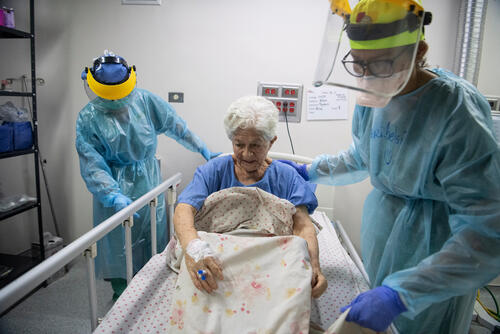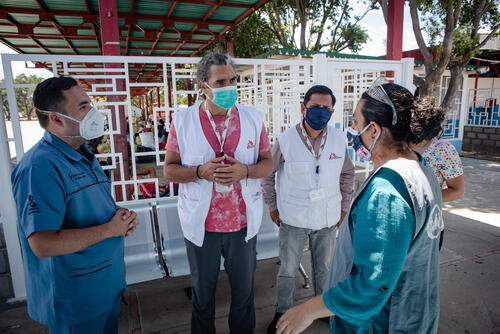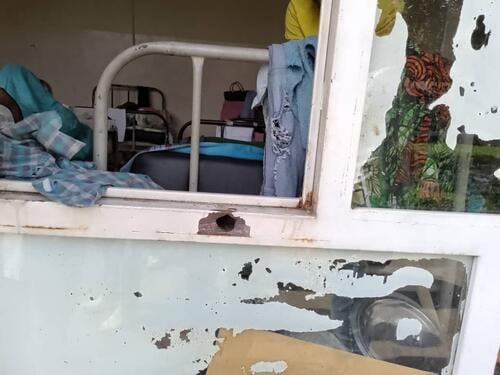- Entry and work permit restrictions for MSF international staff in Venezuela have made it difficult to continue our work on COVID-19.
- As a result, MSF has been forced to withdraw from the coronavirus COVID-19 response in the Ana Francisca Pérez de León II hospital, Caracas.
- MSF urges Venezuelan authorities to facilitate the entry of essential international staff into Venezuela to ensure high-level care in the COVID-19 response.
Caracas – Médecins Sans Frontières (MSF) has been forced to withdraw from the Ana Francisca Pérez de León II hospital, in Petare, northeast Caracas, Venezuela, where we had been assisting with the COVID-19 response since March. This decision was made after entry restrictions into the country were imposed on MSF’s specialist humanitarian personnel. These restrictions made it impossible for us to carry out the essential activities necessary to treat COVID-19 patients to our standards.
“We have spent months looking for possible alternatives that would have allowed us to avoid reaching this irreversible outcome,” said Isaac Alcalde, MSF's general coordinator in Venezuela. “But it is not possible for us to continue to work with the Pérez de León II hospital.”
MSF requested work permits for our essential staff at the beginning of the year to fill key positions in our project and has yet to receive a response from the relevant authorities. Since then, we have been in repeated contact with them to try to find a solution.
“The international team has been replaced almost entirely by qualified Venezuelan personnel and remote consultations,” said Alcalde. “But we need specialist staff on site who are familiar with MSF’s processes, so we can guarantee the quality standards that are required for this type of project. Hence we have had to make this difficult decision.”
We have spent months looking for possible alternatives that would have allowed us to avoid reaching this irreversible outcome.Isaac Alcalde, MSF's general coordinator in Venezuela
The collaboration with the Pérez de León II hospital, in response to the spread of COVID-19, began in March with the rehabilitation of the hospital’s biosafety area, and the design of new pathways for patients receiving medical and psychological care. MSF then set up a new inpatient ward, including an intensive care unit, by refurbishing and adapting an old wing of the hospital.
We managed a team of almost 150 people, including doctors, epidemiologists, nurses, psychologists, technicians and hygienists, who treated COVID-19 patients in the biosafety area. MSF also provided financial support to almost 100 direct employees of the hospital, so they could continue to work there. In total, MSF has screened around 3,500 people for COVID-19 in this project.
In addition, our work had an impact on other areas of the hospital, as has been recognised by the hospital management. Training and donations of clinical supplies have improved care for patients admitted to the hospital with other illnesses, and have improved the safety of other hospital staff.
MSF will gradually withdraw from the hospital. While we do so, we will place special emphasis on training staff to safely and effectively treat COVID-19.
“Given the possibility of a second wave of COVID-19 patients, MSF has chosen to leave some of the medical supplies and has made a donation of drugs to the hospital,” said Alcalde. “We have also strengthened the application of medical protocols by training hospital staff. Our very positive relationship with them has greatly benefitted the patients that have been treated there.”
“For now, we are going to concentrate our efforts on treating severe and critical COVID-19 patients at the Vargas hospital and have managed to maintain our other medical programmes outside Caracas,” continued Alcalde. “However, we are concerned that the situation we are now seeing at the Pérez de León II hospital, caused by restrictions on the entry of humanitarian personnel, could end up affecting other MSF projects in the coming months.”
MSF reiterates our commitment to continue assisting the Venezuelan people and urges the national authorities to facilitate the arrival of humanitarian personnel, so they can continue providing quality medical care to those who need it most.
In Venezuela, MSF has adapted its projects in response to the COVID-19 health emergency, to give priority to the most vulnerable groups it is assisting in Anzoátegui, Amazonas, Bolívar, Sucre, Táchira and Miranda, and the Capital District, where we currently support 39 health facilities. In the first six months of this year, we conducted almost 80,000 medical consultations, 42,500 health promotion awareness-raising sessions and more than 5,000 training sessions for medical and non-medical personnel. We tested almost 110,000 people for malaria, with 25,000 positive cases diagnosed and receiving treatment. In the municipality of Sifontes in Bolívar state alone, we contributed to a 60 per cent reduction in the number of positive cases of malaria between 2017 and 2020.






